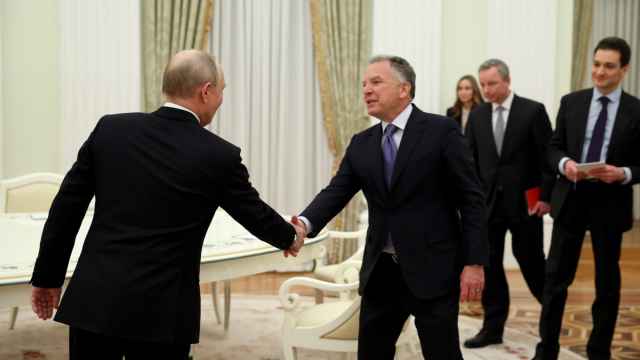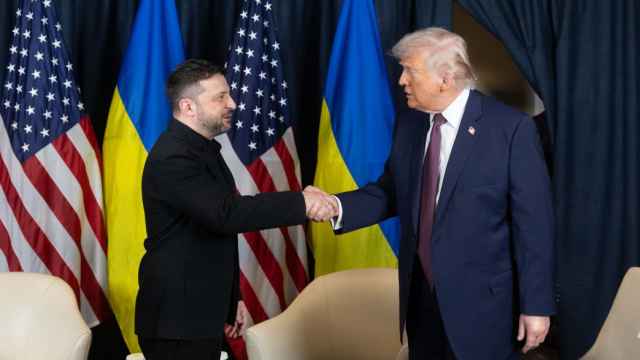My colleagues and I were enjoying dinner in a Moscow cafe when one of my friends began looking distressed. He said, "Something has been happening that is really upsetting me. Did you see the man and woman who came in about an hour ago with a little boy? They sat down at the table behind you, but after only a few minutes they got up and left the little guy alone. I think he is only about age 5 or 6 and has been trying so hard not to cry. A waitress brought him some food, but he hasn't touched any of it."
I immediately turned around and saw the small child near my chair. My two friends and I got up and knelt beside him. We invited him to sit with us, and while he adamantly shook his head no to us, he was unable to say no through the tears that began escaping from his pale-blue eyes. We told him we would watch out for him and make sure he was safe until his parents returned. He was trembling as he nodded in response.
When his parents finally returned, we couldn't help but overhear them as they sat down at their table. They did not apologize to their son for leaving him alone for over an hour, nor were they in any way sympathetic to his tears and obvious distress. Instead they laughed and said, "Well, we weren't gone that long and we told you we would be back! The next time we leave, we will give you a watch so you will know when we are returning." And the frightened little boy's mother and father continued to laugh and talk between themselves and completed ignored the fact that their son was very afraid and could easily have been abducted while they were absent.
My friends and I discussed the situation for quite a while. They had been in my classes when we addressed the issue of how during Soviet times, many children were left alone when their mothers were required to work and there were no relatives or child-care facilities available. I wrote of this situation last week and the tragedies that resulted from this imperative.
I realized that this little boy's parents probably thought, "Well, leaving him alone for an hour or so is no big deal. After all, he had food, it was a warm place, and there were plenty of people around him. He certainly should not complain. When I was a child, I was left alone for 10 hours a day in a freezing apartment in the winter with very little food. And that went on for years!"
I have listened to numerous stories attesting to the fact that leaving children alone is still common today in former Soviet countries. Many parents who experienced being left alone as children regard this as a normal experience for their little ones even though government requirement for doing so no longer exists. They may not leave their children for days on end, but they still believe that a few hours alone is tolerable for even a small child.
One of my colleagues related that she has a friend who married an American man and now lives in California. When this woman came back to Moscow to visit, she mentioned that her mother-in-law is angry because she leaves her 4-year-old daughter alone for several hours each week when she goes to the gym or to get her hair done. The Russian bride could not understand why her daughter's grandmother should be so upset over such a small thing.
When we discuss these situations in my classes, I share that in many other countries, parents or caregivers could be arrested and the children taken from them for "such a small thing" as leaving a child alone. Many of my students are surprised to learn that people could be open to such severe consequences for such a common occurrence.
I know the old belief that implies "what is common equals normal, and what is normal equals healthy (or something acceptable)" still prevails because I continue to experience it myself.
It was City Day in Moscow, and I was having a great time with my friend listening to a free evening concert on Teatralnaya Ploshchad. It seemed so incongruous to see the statue of Karl Marx enveloped by a Russian rock band playing American songs with the majority of the Russian audience singing along. I'm sure it drove Marx crazy. The enormous crowd was packed tightly together, and I almost did not respond when I felt something brush against my leg. Fortunately, I looked down and was startled to see a tiny child who barely reached my knee. Elbowing bodies aside, I tried to come down to his level. He could not have been more than 3 years old. He was crying silently, and his eyes were huge with fear.
I pulled on my friend's jacket, and she looked down in surprise. We found out that the boy's name was Sasha, and we comforted the little guy as best we could. We decided that the best option would be to find a tall man in the crowd and ask if he would put the boy on his shoulders so his mother and father could see him. We tried to explain to Sasha that this would help to find his parents so he wouldn't be so afraid. Soon he was high in the air visible to the entire crowd. He was up there for about 20 minutes and to my frustration and agitation, no one came for him.
He began to cry, and I took him in my arms and attempted to soothe him. My friend said we should turn him over to the police. At first, I protested as I thought of many horrific stories regarding people's negative experiences with the police department. But I also knew there were very few other options.
My friend and I each took one of Sasha's hands, and we started slowly walking to the edge of the crowd, where several policemen were stationed. I hugged him as I placed his tiny hand into the large hand of the policeman. I could not hold back my tears.
We stood and watched as this abandoned toddler walked away with a complete stranger. My friend said, "I think probably his mother or his father had too much vodka to drink and haven't even realized Sasha is missing. Do you think they even care that he is gone? I wonder what they were thinking bringing a tiny child to a place like this at night. They must have had parents who role-modeled this kind of behavior so it feels normal for them."
I had nightmares about Sasha for a very long time.
Marilyn Murray is an educator specializing in the treatment of trauma, abuse and deprivation, with more than 2,000 people attending her classes in Russia and other countries from the Commonwealth of Independent States over the past 10 years. Her second book, "The Murray Method," will be released in English and Russian this summer. You can read her interview with The Moscow Times .
A Message from The Moscow Times:
Dear readers,
We are facing unprecedented challenges. Russia's Prosecutor General's Office has designated The Moscow Times as an "undesirable" organization, criminalizing our work and putting our staff at risk of prosecution. This follows our earlier unjust labeling as a "foreign agent."
These actions are direct attempts to silence independent journalism in Russia. The authorities claim our work "discredits the decisions of the Russian leadership." We see things differently: we strive to provide accurate, unbiased reporting on Russia.
We, the journalists of The Moscow Times, refuse to be silenced. But to continue our work, we need your help.
Your support, no matter how small, makes a world of difference. If you can, please support us monthly starting from just $2. It's quick to set up, and every contribution makes a significant impact.
By supporting The Moscow Times, you're defending open, independent journalism in the face of repression. Thank you for standing with us.
Remind me later.





